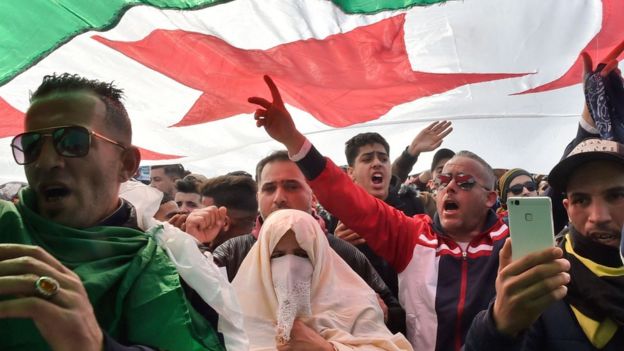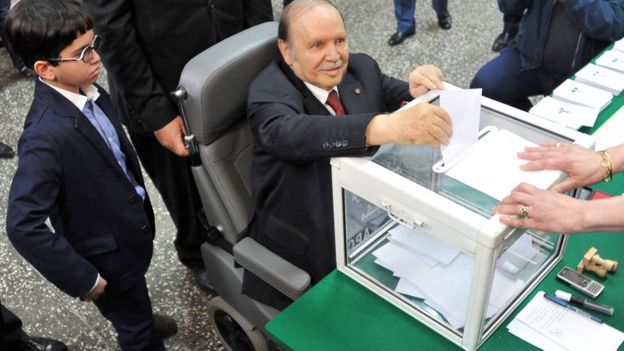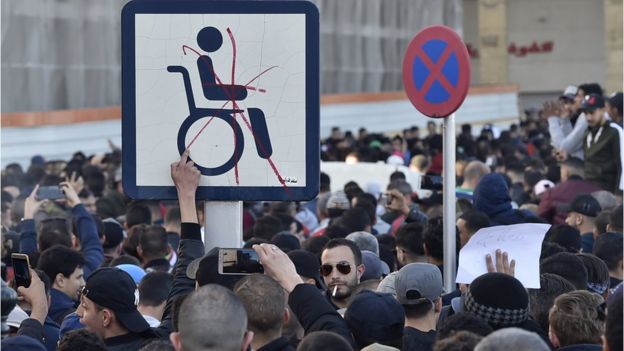
This article is more than
6 year old
It is a rare show of dissent in the North African country, where more than 30% of people aged under 30 are unemployed.
Yes, they are the biggest protests against President Bouteflika since he came to power 20 years ago in elections that followed the country's bloody civil war.
People have taken to the streets in various cities 10 days after his candidacy for the presidential election was confirmed.
The demonstrations are being organised on social media - and while the trigger has been Mr Bouteflika's re-election bid, anger is also being expressed about perceived deep-rooted corruption among the ruling elite.
In particular it is young people, who have not usually expressed an interest in Algeria's party politics.
University students have joined in as well as lawyers.

Even journalists working at the public broadcaster took part in one protest. They denounced the censorship imposed by managers that has led to the protests not being covered on state TV and radio.
The protests have been growing in strength this week.
Only one opposition politician is so far taking advantage of the situation - Ali Benflis, a former prime minister and Mr Bouteflika's fiercest rival, has been participating in the rallies.
Djamila Bouhired, a respected heroine of the independence war against former colonial power France, has also been seen with the protesters.
Tear gas has been fired during some protests, but Prime Minister Ahmed Ouyahia has praised the generally peaceful demonstrations, highlighting the moment when protesters offered roses to police officers.

But he warned that the uprising in Syria in 2011, which later descended into a brutal conflict, "started with exchanges of roses".
The ruling coalition of the National Liberation Front (FLN) and the National Democratic Rally (RND) clearly did not expect such resistance to Mr Bouteflika's bid for a fifth term.
They have until Sunday to review their choice of candidate and propose an alternative to the ailing Mr Bouteflika.
But this is not very likely to happen.
For nearly two decades Mr Bouteflika's government managed to maintain social stability thanks to soaring oil prices.

This enabled it to invest in huge infrastructure projects, like big housing estates with affordable homes and tram networks across the country.
Thousands of young people also benefited from a generous loan scheme, organised by ANSEJ, a national agency supporting small businesses, and were not expected to repay the grants.
But the economy has been floundering since oil prices started to dive a few years ago.
The government no longer has the means to fund generous schemes and unemployment has become a big problem.
No, people are also upset by a drug-trafficking scandal that shook the establishment last year leading to the sackings of some top officials.
It involved the seizure from a container ship of more than 700kg (1,540lb) of cocaine reportedly destined for a prominent businessman.
There is also resentment about the power of a growing number of business magnates, who are close to the government.
An example of their influence came in 2017 when then-Prime Minister Abdelmadjid Tebboune tried to tackle Algeria's trade deficit.
He banned the import of some products, which the businessmen did not like, and he was sacked within two months.
He is rarely seen in public since suffering a stroke in 2013 and is currently undergoing medical checks in Switzerland.
Mr Bouteflika first took office when Algeria was embroiled in a brutal civil war with Islamist insurgents, and is credited with curbing the conflict and restoring economic stability.
He amended the constitution in 2008 to remove the two-term limit on the presidency, effectively giving himself the option of remaining head of state for life.
Mr Bouteflika won presidential elections in 2014 despite doing no personal campaigning.
The credibility of that election was questioned but no opposition figure has so far won enough popular support to take him on.
This time round Mr Benflis may have a chance although he has not yet decided if he will run and has been defeated twice before.